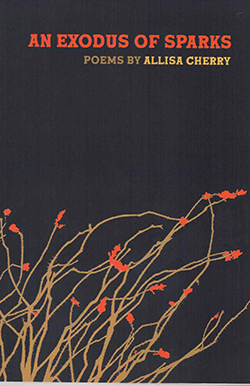An Exodus of Sparks, poetry by Allisa Cherry; East Lansing, Michigan: Wheelbarrow Books, an imprint of Michigan State University Press; © 2025; ISBN 9781611-865219; 82 pages plus appendices; $15.95.

 SAN DIEGO – Poet Allisa Cherry is entranced by Hebrew Scriptures, turning to them to express her anguish over the tragic lives of the members of a Mormon family. A grandmother had a double mastectomy; a father died of radiation poisoning caused by nuclear testing in the desert; a brother died in a car accident before he was 20; and a wife, caught in a loveless marriage, divorces her ne’er-do-well husband.
SAN DIEGO – Poet Allisa Cherry is entranced by Hebrew Scriptures, turning to them to express her anguish over the tragic lives of the members of a Mormon family. A grandmother had a double mastectomy; a father died of radiation poisoning caused by nuclear testing in the desert; a brother died in a car accident before he was 20; and a wife, caught in a loveless marriage, divorces her ne’er-do-well husband.
These are not the usual subjects for poetry; they are riveting. I was fascinated by Cherry’s biblical allusions. In the poem, “Unreadable,” a woman stops traffic to render aid to a pedestrian hit by a car, “her hand thrust out like Moses before the Red Sea.” This leads the observing poet to think back to her school days when “I imagined the multitude of fish suspended in those massive cliffs of seawater must have been so perplexed watching the Israelites walk across the ocean floor, as they hung there, a wall of unblinking eyes, their round mouths opening and closing.”
In “Still, Small Voice,” a girl’s father removes a beetle that became embedded in her hair, and laughs “until the corner of his eyes seem etched with Hebrew shin as he gazes with wonder upon the June bug.”
In “Mogollon Rim,” as a father, whose son has been killed in an accident, trudges toward a mule deer giving birth, “we set out like Isaac and Abraham.”
In “Bleached to Brightness,” a daughter uncovers her father’s nakedness, “And I begin to understand the tenderness of Joseph, his hand upon his father’s thigh, promising to take his body away from Egypt to be buried.”
Beginning with “Sage: A Note to Self” in which the poet vows: “This is how I will arrive at salvation. I’ll pull Moses from the deserts of Judea, place him in Apache County [Arizona], the poet has a multi-poem reverie, imagining in “The Assumption of the Body of Moses,” that “My hands exhume your body from Moab’s shadowy folds.” In “The Corruption of the Body of Moses,” she fantasizes that “like a skittery deer upon Mount Tabor I dance to make you look at me.” In “The Radiance of the Body of Moses,” she recalls that “You once ran like a mustang before God’s children and brought each one back through the sage where they strayed.”
Beautiful imagery leavens this poet’s cruel world.
*
Donald H. Harrison is publisher and editor of San Diego Jewish World.